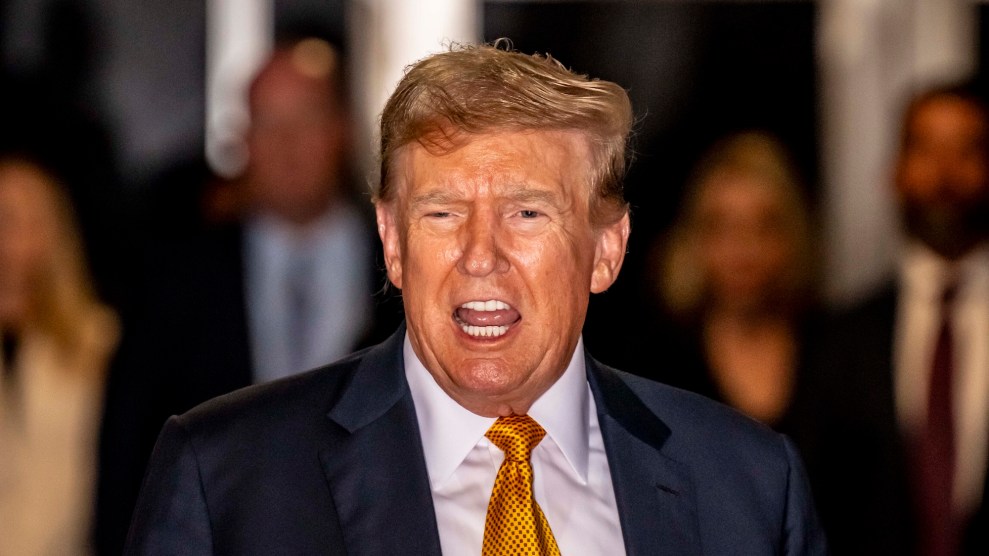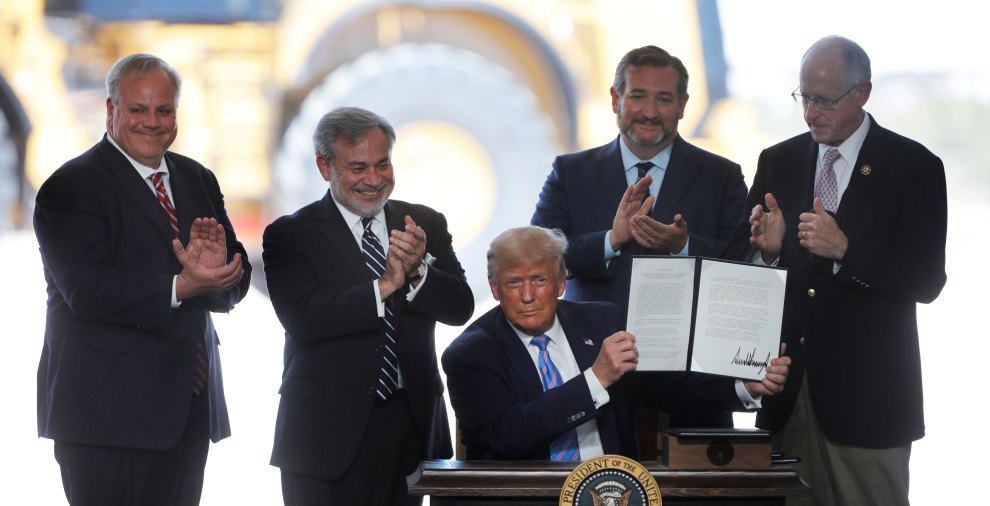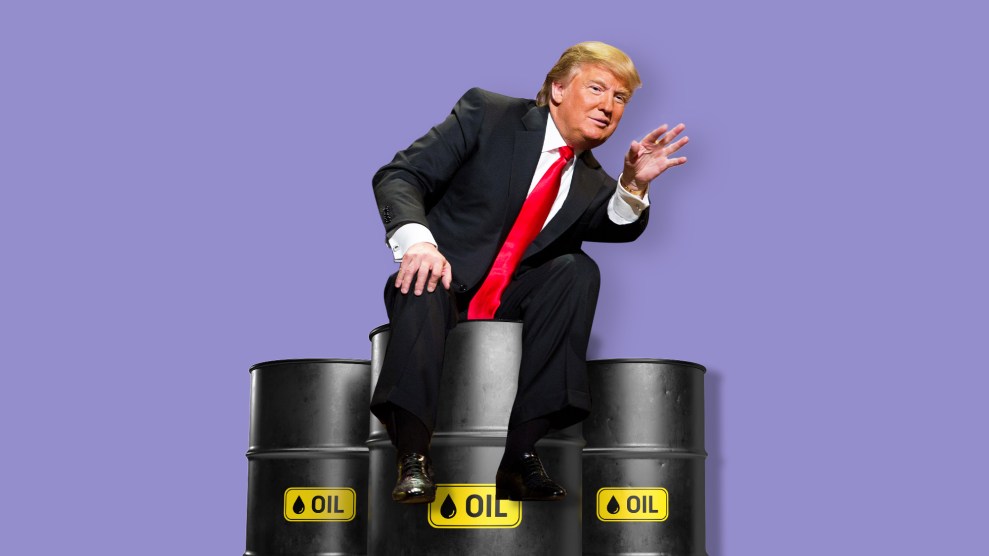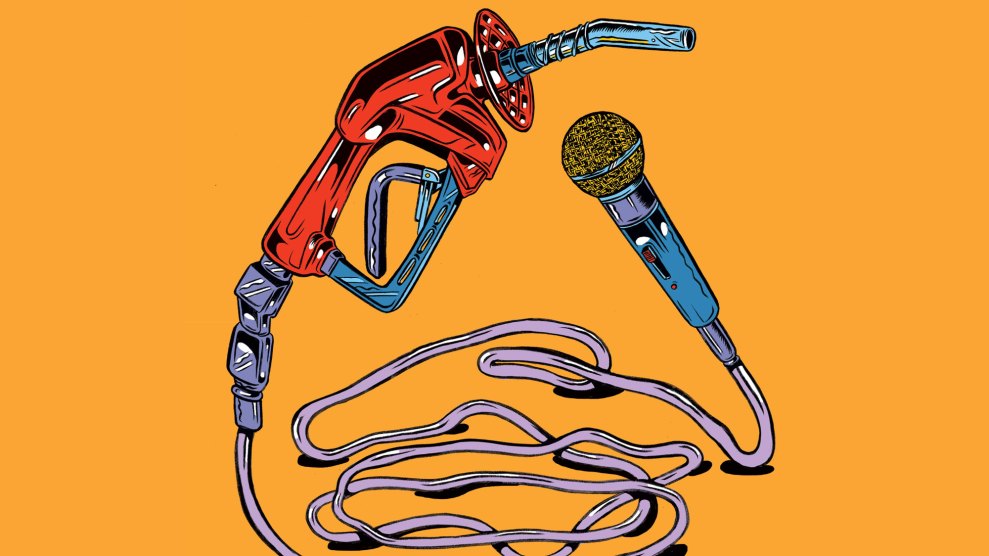
Donald Trump speaks outside his criminal hush-money trial in Manhattan. Mark Peterson/Pool Photo/AP
This story was originally published by the Guardian and is reproduced here as part of the Climate Desk collaboration.
Donald Trump was continuing to ask fossil-fuel executives to fund his presidential campaign on Wednesday, despite scrutiny of his relationship with the industry.
The former president attended a fundraising luncheon at Houston’s Post Oak hotel hosted by three Big Oil executives.
The invitation-only meeting comes a day after the defense rested its case in Trump’s criminal hush-money trial, and a week after Houston was battered by deadly storms. The climate crisis, caused primarily by the burning of fossil fuels, has created the conditions for more frequent and severe rainfall and flooding, including in Texas.
“Donald Trump is telling us who he is, again. He has already asked oil executives for a billion dollars for his campaign.”
“Houstonians are staring at Trump in disbelief as he flies in to beg Big Oil for funds just days after the city’s climate disaster,” said Alex Glass, communications director at the climate advocacy organization Climate Power, and a former Houston resident.
It also follows a fundraising dinner at Trump’s Mar-a-Lago club last month, where the former president reportedly asked more than 20 oil executives for $1 billion in campaign donations from their industry and promising, if elected, to remove barriers to drilling, scrap a pause on gas exports, and reverse new rules aimed at cutting car pollution.
“Donald Trump is telling us who he is, again,” said Pete Maysmith, a senior vice-president at the environmental nonprofit the League of Conservation Voters. “He has already asked oil executives for a billion dollars for his campaign; we can only assume this week’s meeting is to haggle over exactly what they will get in return.”
Executives from two of the companies reportedly represented at the Mar-a-Lago meeting were among the hosts of Trump’s Wednesday’s fundraiser.
Harold Hamm, the executive chairman and founder of Continental Resources and one of the Wednesday luncheon organizers, is a longtime Trump supporter and was reportedly also at the April dinner.
Hamm, a multibillionaire, was a major player in the rush to extract oil from the Bakken shale formation, which stretches across the US midwest and Canada.
During Trump’s first presidential campaign, Hamm was also reportedly one of the seven top donors to receive special seats at Trump’s inauguration. The oil magnate was briefly under consideration to be energy secretary during the former president’s first term but reportedly turned down the position. He turned away from Trump after his 2020 loss, choosing to donate to his opponents, but then donated to Trump’s primary campaign in August.
One of Hamm’s Wednesday co-hosts was Vicki Hollub, chief executive of Occidental Petroleum, which was also represented at the Mar-a-Lago fundraiser. Hollub has been criticized by climate activists for investing in carbon-capture technology in an effort to continue extracting oil and gas, despite warnings that fossil fuels must be phased out to avoid the worst effects of climate change.
Congressional Democrats launched an investigation into Occidental Petroleum and other companies on Wednesday after the Federal Trade Commission last month accused the head of Pioneer Natural Resources of illegal collusion with the oil production cartel Opec+ to keep fuel prices high.
The third co-host of Wednesday’s meeting, Kelcy Warren, is the executive chairman of Energy Transfer Partners—a company with whom Trump has close financial ties.
Throughout the 2024 campaign cycle, Warren has donated more than $800,000 to Trump’s campaign. In the 2020 election cycle, he held at least one fundraiser for the former president in 2020 and donated $10 million to a pro-Trump Super Pac.
During his first presidential run in 2016, Trump invested in the company while also receiving more than $100,000 in campaign contributions from Warren, the Guardian found.
The industry has so far funneled at least $7.3 million to Trump’s 2024 campaign and associated groups.
Warren appears to have benefited from Trump’s first term: within days of taking office in 2017, Trump approved construction of his company’s highly controversial Dakota Access pipeline, triggering outrage from climate advocates, conservationists and nearby Indigenous tribal organizations.
Last year, the Texas Tribune found that Energy Transfer Partners profited to the tune of $2.4 billion as gas demand soared during Texas’s deadly winter freeze and the ensuing collapse of the state’s energy grid.
The fossil-fuel industry has funneled $7.3 million to Trump’s 2024 campaign and associated groups, making it his fifth-largest industry donor this election cycle.
The $1 billion “deal” that Trump allegedly offered to oil executives last month could save the industry $110 billion in tax breaks if he returns to the White House, an analysis last week found.
Last week, Rep. Jamie Raskin (D-MD) launched a House oversight investigation into nine oil companies after Trump reportedly offered to dismantle Biden’s environmental rules for their benefit and requested $1 billion in contributions to his presidential campaign.
Sen. Sheldon Whitehouse (D-RI) has also expressed interest in formally investigating the Mar-a-Lago meeting. Citizens for Responsibility and Ethics, the powerful Washington watchdog, also told the Guardian it is investigating.













